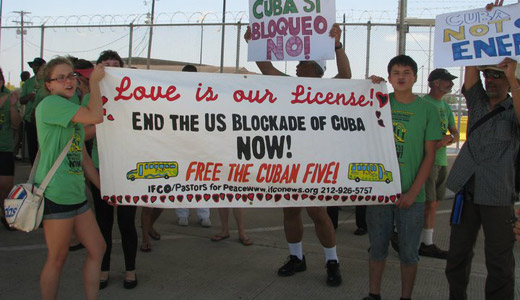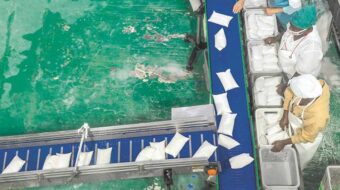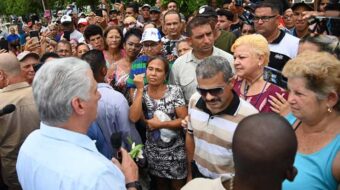
The half-century-old U.S. economic blockade against Cuba was broken in one small corner of the United States on June 30. Three groups of ordinary citizens had come together to defend Cuba’s right to set its own course.
That day a small truck and a car from Maine crossed the international border at Norton, Vt., to join 30 or so Quebecers at a brief solidarity gathering just north of the border. Together they then carried boxes of humanitarian aid material to the U.S. border station where they would be loaded onto the Mainers’ vehicles.
U.S. officials knew that donated supplies were heading for Cuba and also that U.S. blockade rules were being violated, specifically those requiring licenses for humanitarian donations to Cuba. Nevertheless, after inspecting the boxes efficiently and amiably, the border officials let them pass. They joined in talking about the activists’ return to the border next year.
That no license was requested or obtained was intentional. People allied to the three groups are all rejecting U.S. regulations aimed at causing suffering in Cuba and policies seen throughout the world as illegal, immoral, and cruel. For 20 years, the United Nations General Assembly has supported a Cuban resolution calling for an end to the blockade. Recently, the United States and Israel have been alone in rejecting the resolution.
Since 1992 one of the organizations, Let Cuba Live of Maine, has tried to inform the public and elected officials about U.S. Cuban policies, encouraged people-to-people U.S.-Cuba contacts, and engaged in direct action.
New-York-based Pastors for Peace began the Cuba Friendshipment Caravans in 1992 just as the U.S. anti-Cuban blockade was being tightened and Cuba’s economic survival was under threat from loss of Soviet bloc trading partners.The caravans challenge U.S. policies by rejecting the required U.S. authorization to take humanitarian aid and U.S. citizens to Cuba.
For 20 years Let Cuba Live has contributed humanitarian supplies to the caravans and recruited Maine people to get aboard and go to Cuba. This year, the 20th anniversary year of both the caravans and Let Cuba Live, the latter group held public meetings for talk about Cuba and Pastors for Peace and film showings that included “Joe Marti, Eye of the Canary,” “Maestra” (about Cuba’s 1961 literacy campaign), and “Little Yellow School Bus” (story of the early Friendshipments). Maine people attending these sessions showed unprecedented generosity in donating toward this year’s Friendshipment.
The Caravane d’amitié Québec-Cuba of Montreal has long supported the Friendshipments. Members are especially active on behalf of the Cuban Five U.S. political prisoners. Annually for 14 years, the Caravane has collaborated with Let Cuba Live in bringing aid material across the international border to be transferred to a Friendshipment bus and taken to Cuba. In a “reverse challenge,” Let Cuba Live in 2001 took aid material north to Montreal for shipment to Cuba.
At the gathering prior to the June 30 crossing, a Let Cuba Live spokesperson predicted that this crossing, like the two previous ones at Norton, would take place without incident. He explained that at crossings earlier at Highgate Springs, Vermont, and Coburn Gore, Maine, activists resisted border officials’ harassment and confiscation of aid material and vehicles. His suggestion was that authorities welcomed relief from the extra paperwork and slowdown of regular border traffic caused by confrontations.
Maria Sanchez of Portland, Maine, lauded the international scope of resistance to the U.S. anti-Cuban blockade. Born in Peru, she noted that among Quebecers and Mainers on hand were those originating from several Latin American, European, and Middle Eastern countries. Sanchez and her two daughters joined the 2011 Pastors for Peace Friendshipment to Cuba.
Donated goods from Quebec and Maine went on to Boston on July 2 via a Let Cuba Live truck. At a Friendshipment send-off event there, they were loaded onto a Friendshipment bus that, along with other buses traveling south through the United States, will arrive in McAllen, Texas, on July 15. At solidarity sessions along the way, buses will take on people and aid material. From McAllen, buses and supplies proceed to Tampico, Mexico, where they are put on board a ship bound for Cuba.
The present writer, representing Let Cuba Live of Maine, is joining the current Friendshipment. Websites of the three organizations featured in this article are: www.ifconews.org, www.letcubalive.org, and www.solidaritequebeccuba.qc.ca.
Photo via IFCO/Pastors for Peace.












Comments